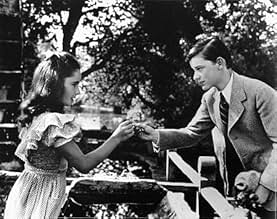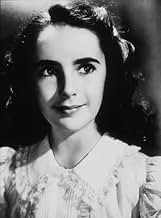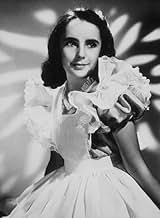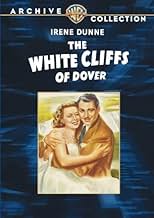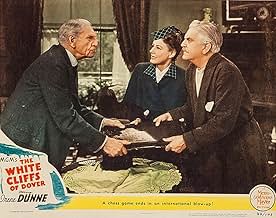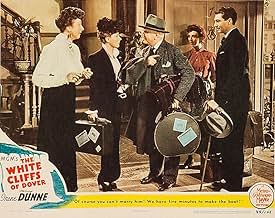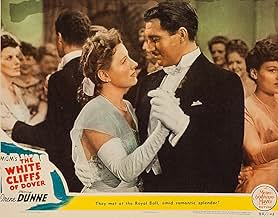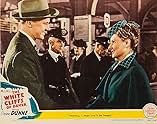AVALIAÇÃO DA IMDb
7,0/10
1,9 mil
SUA AVALIAÇÃO
Susan viaja com o pai para a Inglaterra para passar férias. Convidada para um baile, Susan conhece Sir John Ashwood e se casa com ele após um romance turbulento.Susan viaja com o pai para a Inglaterra para passar férias. Convidada para um baile, Susan conhece Sir John Ashwood e se casa com ele após um romance turbulento.Susan viaja com o pai para a Inglaterra para passar férias. Convidada para um baile, Susan conhece Sir John Ashwood e se casa com ele após um romance turbulento.
- Direção
- Roteiristas
- Artistas
- Indicado a 1 Oscar
- 3 vitórias e 1 indicação no total
May Whitty
- Nanny
- (as Dame May Whitty)
Harry Allen
- English Cabbie
- (não creditado)
Wilson Benge
- Chauffeur
- (não creditado)
Matthew Boulton
- Immigration Officer
- (não creditado)
Edmund Breon
- Major Rupert Bancroft
- (não creditado)
Clifford Brooke
- Indian Major in Boardinghouse
- (não creditado)
Avaliações em destaque
Finally caught up with this one on a recent Turner Classic Movies broadcast and found it quite enthralling, despite its rather protracted length and of-its-era WWII wartime propagandizing. It's exceptionally smoothly directed by Clarence Brown and mounted in the very plushest M-G-M manner. It's impossible to imagine a story like this being as lavishly produced today. The cast is attractive and capable, with Irene Dunne (beautifully gowned and coiffed throughout) more than holding her own amidst a virtual platoon of marvelous British actors and actresses. The ubiquitous Frank Morgan manages to be minimally irritating; in fact he's quite credibly effective as Dunne's irascible American father. And even Herbert Stothart, whose scores often sound rather syrupy and intrusive to these ears, provides one of his best accompaniments to a story that spans decades and quite a gamut of emotions. Those whose attention spans haven't been stunted by the fragmented way we receive so much information and entertainment today should find this a rewarding example of how cinema audiences of several decades ago were respectfully treated by the Hollywood studio system at its professional best.
With a title based on a very popular song on both sides of the pond in those World War II years, The White Cliffs Of Dover is seen in flashback by Irene Dunne of her life as an American in Great Britain in the years covering two World Wars. It was one of those hands across the oceans films so popular in those days.
I heard it said that the main fact about the 20th Century that one should realize in studying it is that the United States and Great Britain both spoke a common language. That fact made us overcome a few cultural differences and was the reason America entered two World Wars to save a Great Britain from invasion.
Thus it was for Irene Dunne who came over with her father Frank Morgan on holiday in 1914 and met and married a minor titled fellow played by Alan Marshal. Marshal is killed and she spends a long widowhood raising their son and heir to his title. She lives with her mother-in-law, Gladys Cooper and raises her son who at various times is played by Roddy McDowall and Peter Lawford. The son rather fancies the daughter of one of their tenants played at various times by Elizabeth Taylor and June Lockhart.
Of course this interoceanic love feast has a rather rocky beginning, especially when Frank Morgan while arguing chess with C. Aubrey Smith gets confronted with the fact that the chess board and pieces were the property of the looted White House from the War of 1812. It's my favorite scene in the film.
Dunne who ages gracefully and magnificently gives a stirring performance as a woman who lost what she loved in one war and is ready to sacrifice again for her adopted country. I've a feeling that the folks at MGM might have had her character as an answer to that real female American expatriate, Lady Nancy Astor and that we were all not members in good standing of the Nazi appeasing Cliveden set.
There's also a scene similar to the one in Mrs. Miniver where Greer Garson has to entertain a wounded German flier, Helmut Dantine where he's made a symbol of what they're at war against. Dunne, Morgan, and McDowall entertain a pair of German boys on holiday and when the discussion turns to politics it gets pretty heated. These two are thinking nothing more than winning what they should have won back in 1918.
The White Cliffs Of Dover is a nice film, typical of the era it came out of. You do wonder though if Irene Dunne had met a nice German guy from the Weimar Republic days how that might have been dealt with.
I heard it said that the main fact about the 20th Century that one should realize in studying it is that the United States and Great Britain both spoke a common language. That fact made us overcome a few cultural differences and was the reason America entered two World Wars to save a Great Britain from invasion.
Thus it was for Irene Dunne who came over with her father Frank Morgan on holiday in 1914 and met and married a minor titled fellow played by Alan Marshal. Marshal is killed and she spends a long widowhood raising their son and heir to his title. She lives with her mother-in-law, Gladys Cooper and raises her son who at various times is played by Roddy McDowall and Peter Lawford. The son rather fancies the daughter of one of their tenants played at various times by Elizabeth Taylor and June Lockhart.
Of course this interoceanic love feast has a rather rocky beginning, especially when Frank Morgan while arguing chess with C. Aubrey Smith gets confronted with the fact that the chess board and pieces were the property of the looted White House from the War of 1812. It's my favorite scene in the film.
Dunne who ages gracefully and magnificently gives a stirring performance as a woman who lost what she loved in one war and is ready to sacrifice again for her adopted country. I've a feeling that the folks at MGM might have had her character as an answer to that real female American expatriate, Lady Nancy Astor and that we were all not members in good standing of the Nazi appeasing Cliveden set.
There's also a scene similar to the one in Mrs. Miniver where Greer Garson has to entertain a wounded German flier, Helmut Dantine where he's made a symbol of what they're at war against. Dunne, Morgan, and McDowall entertain a pair of German boys on holiday and when the discussion turns to politics it gets pretty heated. These two are thinking nothing more than winning what they should have won back in 1918.
The White Cliffs Of Dover is a nice film, typical of the era it came out of. You do wonder though if Irene Dunne had met a nice German guy from the Weimar Republic days how that might have been dealt with.
This movie telecast recently on TCM was one of many made to promote better relations between the ordinary people of Britain and the USA. Michael Korda claims in his book that his father, Sir Alexander Korda was sent to Hollywood by Churchill, before the USA entered the war, with a mission to persuade his movie mogul friends to make movies with pro British themes. By the time this movie was released,there was a large build up of US service personnel in the UK in preparation for invasion of Europe and resentment towards the GI's was not uncommon. For many of todays viewers it may seem to be a little over the top. Howerver it is a classic, if for the only reason, it was our first glimpse of the fabulous Liz Taylor.
The only reference to the White Cliffs of Dover comes in at the beginning of the film as we watch Susan and her friend, Sam Bennet, as they are approaching England by sea. The magnificent cliffs are seen in the distance in all their splendor. Susan, clearly moved by the sight, revels on the many things that await her in London where she and her father are going to spend two weeks vacation.
Alas, when they arrive, they are treated to the typical rainy weather, that puts a damp, no pun intended, in her enjoyment of a city and all things English she has always admired. Instead of finding a place that meets all her expectations, Susan has to endure the weather and the prospect of going back without seeing the sights and places she really wanted to see.
Enter the kind Colonel, the man living in the modest hotel where the Dunns are staying. He invites Susan to a society ball where she meets Sir John Ashwood, the man who will become her husband. John is instrumental in her staying in England. Susan never expected to be married into the rich gentry that John belongs to. In fact, the beginning of her life in the family country estate convinces her she doesn't belong.
It's 1915 and WWI arrives without warning. Susan sees in horror how John goes to his regiment and to the front. He eventually dies, but the son that arrives for her is, in a way, a painful reminder of the great loss she suffered. Like his father, the boy grows up and has to go to war, as it's expected of his kind.
"The White Cliffs of Dover" was directed by Clarence Brown, who gave it a great look. Irene Dunne makes a good impression as Susan, the courageous woman who stays in a strange country and has to make a new life for herself and her new family. Alan Marshal is perfect as the dashing John Ashwood.
In minor roles we see Roddy McDowall, who plays the young John Ashwood. Harry Morgan is Susan's father. Gladys Cooper, May Witty, Peter Lawford, Van Johnson, C. Aubrey Smith, and the rest of the cast do good work. The young Elizabeth Taylor is seen as the young Betsy and June Lockhart appears as the grown up girl in uncredited roles.
"The White Cliffs of Dover" is about loyalty for one's country and how tradition plays a role in the lives of all the people one meets in the story, even during the difficult times these characters had to live.
Alas, when they arrive, they are treated to the typical rainy weather, that puts a damp, no pun intended, in her enjoyment of a city and all things English she has always admired. Instead of finding a place that meets all her expectations, Susan has to endure the weather and the prospect of going back without seeing the sights and places she really wanted to see.
Enter the kind Colonel, the man living in the modest hotel where the Dunns are staying. He invites Susan to a society ball where she meets Sir John Ashwood, the man who will become her husband. John is instrumental in her staying in England. Susan never expected to be married into the rich gentry that John belongs to. In fact, the beginning of her life in the family country estate convinces her she doesn't belong.
It's 1915 and WWI arrives without warning. Susan sees in horror how John goes to his regiment and to the front. He eventually dies, but the son that arrives for her is, in a way, a painful reminder of the great loss she suffered. Like his father, the boy grows up and has to go to war, as it's expected of his kind.
"The White Cliffs of Dover" was directed by Clarence Brown, who gave it a great look. Irene Dunne makes a good impression as Susan, the courageous woman who stays in a strange country and has to make a new life for herself and her new family. Alan Marshal is perfect as the dashing John Ashwood.
In minor roles we see Roddy McDowall, who plays the young John Ashwood. Harry Morgan is Susan's father. Gladys Cooper, May Witty, Peter Lawford, Van Johnson, C. Aubrey Smith, and the rest of the cast do good work. The young Elizabeth Taylor is seen as the young Betsy and June Lockhart appears as the grown up girl in uncredited roles.
"The White Cliffs of Dover" is about loyalty for one's country and how tradition plays a role in the lives of all the people one meets in the story, even during the difficult times these characters had to live.
One of the great crimes of the Academy of Motion Picture Arts and Sciences is that Dunne was never given an Oscar....not even an honorary one! Most of her performances transcend time and come off as fresh and natural today as when they were first delivered. She just must have made it look too easy. The woman could do everything! At any rate, this film features another strong performance from her. She plays a young American girl who comes to England with her father (the irascible Morgan) and is soon swept off her feet by dashing and wealthy Marshall. Before they can enjoy any sort of life together, he is called to serve in WWI and they are separated. This is only part of the story as her life unfolds through the next decades and she struggles with letting her son (McDowall, then Lawford) serve in WWII. The film is obviously patriotic and propaganda filled, but understandably so as WWII was still being waged! Dunne is luminescent in the role and is surrounded by a strong array of familiar supporting actors. Notable are Cooper (endlessly watchable in anything!) and Witty (wonderfully crotchety, yet sentimental.) It is a touch jarring to see Taylor grow into Lockhart (young Taylor barely says anything, but "Yes, Sir John".) Lawford is at his most youthful and appealing. The film has a lot of sentiment and melodrama, but also a lot of heart and a little humor. It winds up being quite touching at times and displays a time long gone, but a patriotism that can still be resurrected when events call for it.
Você sabia?
- CuriosidadesIrene Dunne reads a telegram from her Anglophobe father to a group of English people. Her father begs her not to marry an Englishman she is in love with and tells her "You're a Yankee through and through! Think of Paul Revere! Think of the Old North steeple! Remember the Alabama!" The viewer may become confused at this point. "Remember the Alabama"? Shouldn't it be "Remember the Alamo"? However, since the context of the telegram is anti-British any mention of the Alamo would be irrelevant. What Irene Dunne's father is apparently taking about is the C.S.S. Alabama, one of several Confederate warships that were built in British shipyards over United States protest during the Civil War. These ships attacked U.S. shipping in the Atlantic Ocean. Since Irene Dunne arrives in England in April of 1914 and married just before August 4, 1914 when Great Britain declared war on Germany, the telegram was probably sent close to the 50th anniversary of the sinking of the Alabama by the U.S.S. Kearsarge on June 19, 1864 in the English Channel. The United States sued Great Britain in 1869 over the building of the Confederate warships and was awarded $15.5 million.
- Erros de gravaçãoA gift with a plaque dedicated to First Lady, Dolley Madison, misspells her name "Dolly Madison."
- Citações
Susan Dunn's landlady: [Of Susan]
Susan Dunn's landlady: Such a nice young thing! Not a bit like an American.
- Versões alternativasElizabeth Taylor's scenes are often deleted in older TV prints.
- ConexõesFeatured in Twenty Years After (1944)
- Trilhas sonorasAuld Lang Syne
(1788) (uncredited)
Traditional Scottish 17th century music
Lyrics by Robert Burns
Played during the opening credits and often in the score
Principais escolhas
Faça login para avaliar e ver a lista de recomendações personalizadas
Detalhes
- Data de lançamento
- País de origem
- Idiomas
- Também conhecido como
- Evocación
- Locações de filme
- Empresa de produção
- Consulte mais créditos da empresa na IMDbPro
- Tempo de duração
- 2 h 6 min(126 min)
- Cor
- Proporção
- 1.37 : 1
Contribua para esta página
Sugerir uma alteração ou adicionar conteúdo ausente


